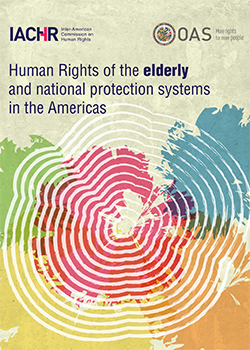
Press Release
IACHR Issues Report on National Protection Systems and the Human Rights of Older Persons
May 23, 2023
Contact info
IACHR Press Office
Distribution List
Washington, D.C. – The Inter-American Commission on Human Rights (IACHR) has issued the report “National Protection Systems and the Human Rights of Older Persons in the Americas”. This is the first report that specifically addresses the human rights of older persons in the region and provides an account of the mechanisms provided by States to protect these rights.
The report reflects the paradigm shift concerning old age held in the Inter-American Convention on Protecting the Human Rights of Older Persons. The Convention states that aging involves just a different stage in an individual’s life cycle and is therefore valuable and dignified. The new paradigm of an active, independent old age requires eradicating discrimination based on age, known as ageism. Ageism unfairly restricts the rights of older persons, turns their problems invisible, and particularly exposes these individuals to various forms of violence.
To draft this report, the IACHR’s Rapporteurship on the Rights of Older Persons monitored progress and challenges concerning the human rights of older persons on both an international and an inter-American scale. States, civil society organizations, and subject-matter experts contributed information that was used in this report. Among other aspects, the report includes the following: (a) recognition of the rights of older persons within the inter-American system; (b) the Inter-American Convention on Protecting the Human Rights of Older Persons and the international human rights standards it enshrines; (c) national protection systems; (d) the rights of older persons held in the Inter-American Convention on Protecting the Human Rights of Older Persons and the outlook concerning national mechanisms; and (e) conclusions and recommendations.
The report outlines a series of standards, policies, and programs implemented by States to protect the rights of older persons. It also presents positive trends, including the fact that all States in the Americas have some kind of normative instrument in place to prioritize the human rights of individuals in this group and social security programs involving non-contributory pensions, priority access to healthcare, and the implementation of various types of interventions to enable the integration of older persons across intergenerational divides and to foster active aging.
The report also notes pending challenges for the protection and enforcement of the rights of older persons. These include a failure to produce and compile statistical data concerning the situation of older persons and concerning programs to prevent, report, and punish violence against older persons and to promote the access of older persons to justice. The report also stresses the intersectional discrimination suffered by older women, older LGBTI persons, older persons who are deprived of liberty, and older migrants, among others.
The document notes that States in the Americas must deepen debate regarding the legal capacity of older persons and the interdiction processes that legally invalidate their consent (for instance, concerning their rights to property and financial autonomy or to decide where they wish to live).
With this report, the IACHR seeks to prompt a conversation on the best ways to protect older persons in the Americas, foster an exchange of successful experiences, and provide useful tools for States to plan relevant policies.
Finally, the IACHR stresses its call on States in the Americas to attain universal ratification of the Inter-American Convention on Protecting the Human Rights of Older Persons.
A principal, autonomous body of the Organization of American States (OAS), the IACHR derives its mandate from the OAS Charter and the American Convention on Human Rights. The Inter-American Commission has a mandate to promote respect for and to defend human rights in the region and acts as a consultative body to the OAS in this area. The Commission is composed of seven independent members who are elected in an individual capacity by the OAS General Assembly and who do not represent their countries of origin or residence.
No. 090/23
3:00 PM


